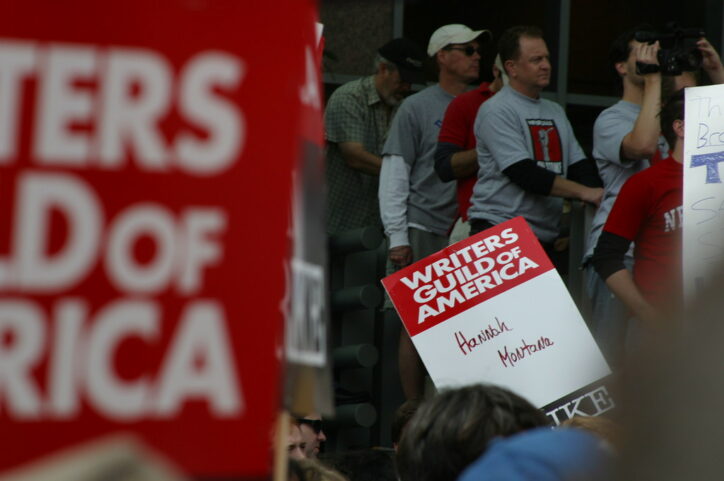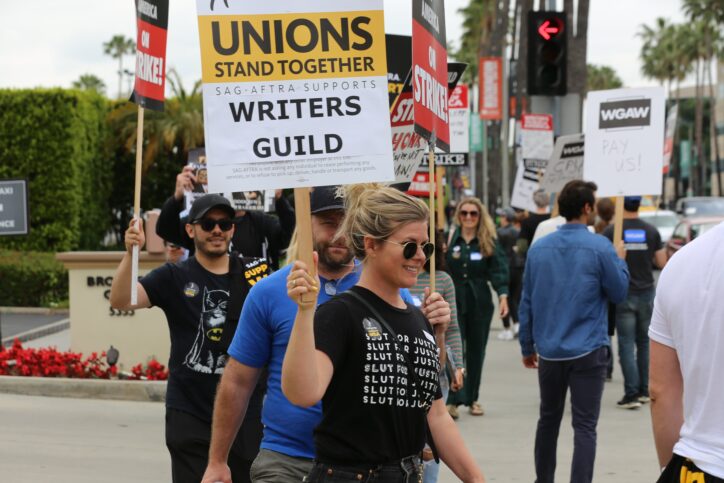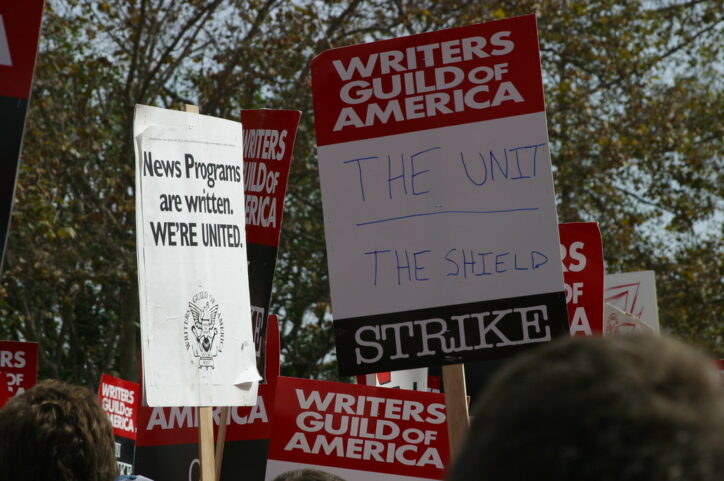Hollywood Strike Update: What’s the Latest on the Writers and Actors?
From Starbucks baristas, factory workers, and Amazon drivers walking off the job during the “summer of strikes” to the ongoing United Auto Workers work stoppages, 2023 is shaping up to be the biggest year for collective action in some forty years.
However, perhaps none of the many labor disputes this year have captured public attention more than the historic dual strikes led by the Writers Guild of America (WGA) and the Screen Actors Guild – American Federation of Television and Radio Artists (SAG-AFTRA), which brought the entertainment industry to a standstill.
The writers’ strike, which ended in September after a staggering 148 days (just days shy of being the longest in the Guild’s history), resulted in an agreement between the WGA and the Alliance of Motion Picture and Television Producers (AMPTP) and was broadly viewed as a victory for the writers.
Meanwhile, the actors’ strike, still ongoing at 24 weeks, is now the longest strike in entertainment history — and as talks recently broke down again when the AMPTP walked away from the bargaining table after refusing to make a counter-offer, there is currently no clear end in sight.
In both strikes, the use of A.I. was a significant aspect of the disputes.
In addition to fair wages and residuals and more secure contracts, the WGA was demanding restrictions on the studios’ use of A.I. to replace writers. Similarly, striking actors are outraged by studio plans to replace background actors with digital likenesses, among other issues.
We have discussed the strikes previously on this blog, and with A.I. taking so central a role, it’s worth checking in for an update on how things worked out for the writers, how things are going for the actors, and what to expect next in the entertainment industry.

Writers’ Strike: WGA Inks New Contract
Following a tentative agreement struck by union leadership, WGA members officially ratified a new contract on October 9th. 99% of members voted in favor of the deal, which WGA West President Meredith Stiehm described as containing “meaningful gains and protections for writers in every sector of our combined membership.”
So, what’s in the new contract?
Effective through May 31, 2026, the three-year agreement provides major progress for writers on key issues like A.I. guardrails, streaming residuals, minimum staffing for writers rooms, data transparency, and fair pay.
A new “success-based” formula allows writers bonuses for original made-for-streaming content that garners high viewership, as well as fairer residual payments, better payment schedules, gains in minimum compensation, and the opportunity to be paid to do at least one rewrite of a drafted original screenplay.
There are also stipulations related to duration of employment which are designed to ensure less-experienced writers have the chance to gain enough exposure and apprenticeship time to grow into showrunners, as well as to allow writers enough time to qualify for healthcare.
One of the key victories for writers in the new deal was the creation of guardrails around A.I., including a provision that gives the Guild itself power over the use of the technology.
Here are some specifics, as outlined by the Guild:
- A.I. can’t write or rewrite literary material, and A.I.-generated material will not be considered source material under the MBA, meaning that A.I.-generated material can’t be used to undermine a writer’s credit or separated rights.
- A writer can choose to use A.I. when performing writing services if the company consents and provided that the writer follows applicable company policies, but the company can’t require the writer to use A.I. software (e.g. ChatGPT) when performing writing services.
- The Company must disclose to the writer if any materials given to the writer have been generated by A.I. or incorporate A.I.-generated material.
- The WGA reserves the right to assert that exploitation of writers’ material to train A.I. is prohibited by MBA or other law.
Critically, the agreement also brought to an end months of financial and emotional hardship endured by writers, who held the line even while being forced to seek second jobs to pay their rent, with one unnamed studio executive claiming the producers planned to let the strike drag on “until union members start losing their apartments and losing their houses.”
As John Oliver put it in his first post-strike episode of Last Week Tonight, “…while I’m happy that they eventually got a fair deal and immensely proud of what our union accomplished, I’m also furious that it took the studios 148 days to achieve a deal that they could have offered on day f—ing one.”

Actors Strike: SAG-AFTRA Negotiations Break Down
As writers resume work, members of SAG-AFTRA continue to strike for better working conditions and fairer compensation.
Although many hoped the WGA deal would generate momentum for an agreement with the actors’ union, as well, that has not, so far, come to pass.
In fact, the AMPTP appears to be resorting to the same underhanded tactics that failed to work against the writers; in a statement on the latest breakdown in talks, SAG-AFTRA described negotiating with the studios “in good faith, despite the fact that last week they presented an offer that was, shockingly, worth less than they proposed before the strike began.”
The statement continued: “We have made big, meaningful counters on our end, including completely transforming our revenue share proposal, which would cost the companies less than 57¢ per subscriber each year. They have rejected our proposals and refused to counter. Instead they use bully tactics.”
“Just tonight,” the actors’ union went on, “they intentionally misrepresented to the press the cost of the above proposal – overstating it by 60%. They have done the same with A.I., claiming to protect performer consent, but continuing to demand ‘consent’ on the first day of employment for use of a performer’s digital replica for an entire cinematic universe (or any franchise project).”
“The companies are using the same failed strategy they tried to inflict on the WGA – putting out misleading information in an attempt to fool our members into abandoning our solidarity and putting pressure on our negotiators. But, just like the writers, our members are smarter than that and will not be fooled.”
This past Monday, SAG-AFTRA chief negotiator Daniel Crabtree-Ireland announced that negotiations would resume, with the exact dates to be determined.

Video Game Industry: The Next Battlefield?
As the actors continue their strike, their focus is also shifting to another lucrative market: video games.
Actors who provide voice and motion capture performances for video games are now aiming to improve their working conditions and pay in this sector.
These performers, who are also represented by SAG-AFTRA, voted at the end of last month to authorize a strike if negotiations on a new labor contract fail. While this move does not mean the performers are striking just yet, it does set the stage for another potential work stoppage in the entertainment industry.
The most urgent concerns for these actors are fair pay, healthcare, breaks, and — unsurprisingly — protections against artificial intelligence.
Should this expansion of the actors’ strike come to pass, it could put new pressure on Hollywood studios to negotiate better terms for the performers.
In the meantime, the Hollywood strikes have had a ripple effect throughout the entertainment industry and even on other industries. For example, many Hollywood workers have returned to the restaurant industry to make ends meet, bearing the same kinds of financial and emotional burdens the writers endured.
However, the victories gained by the WGA demonstrate the power and importance of solidarity and collective action. In a year like 2023, as labor activism sweeps the nation, the AMPTP may find themselves a step behind the times.
